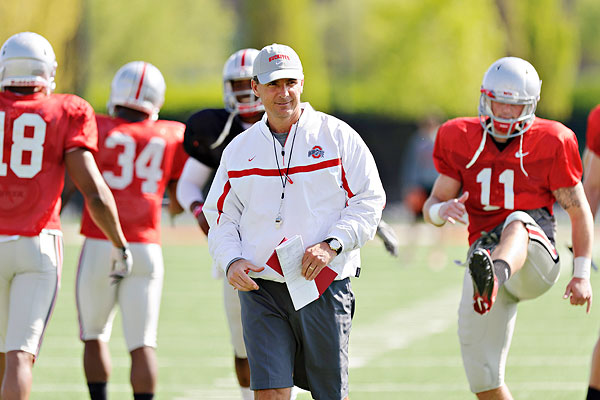Sportswriting is often overlooked as a source of serious journalism, including long form narrative nonfiction. Yet many of my favorite nonfiction writers — Gary Smith, Gay Talese, Buzz Bissinger — have focused much of their talents on the world of sports. Wright Thompson’s “Urban Meyer Will Be Home for Dinner,” from the August 6 edition of ESPN the Magazine, is one the better recent profiles I’ve read.
This profile looks at the new coach of the Ohio State football team, starting his new job after struggling with life-threatening stress and burnout at his last job. It’s an honest look at a man who struggling to reconnect with his family and his ambition at the same time. If you’re a sports fan, as I am, a lot of Meyer’s career choices have been mocked and criticized by sports pundits (Meyer quit his job from Florida twice before retiring and unretiring to go to Ohio State); few really had any sense of what was going on with him or what was driving his decisions. This story reveals a lot about about the personal crises Meyer faced.

Photo by Jamie Sabau for ESPN The Magazine
One thing I admire about this piece is that it is a very traditional feature story; no complex structure, no deception, no literary trickery. The narrative is almost the textbook curve of a “hero’s journey.” Aside from the opening scene, it is mostly a straightforward chronological story, giving us Meyer’s history leading up to today and the conflicts in his life. Thompson offers this direct “nut graf” in the ninth paragraph:
In front of him is a second chance. Behind, there’s his old dream job in Florida, which he quit twice in a year, and the $20 million he left on the table, unable to answer the simplest of questions: Why am I doing this? During the break, he studied himself for the first time in his life, looking for a new him or maybe trying to get the old him back — the person he was before a need for perfection nearly killed him.
And Thompson employs the strongest tool for a nonfiction writer: scenes. The story if packed with little moments from Meyer’s life, flashes of emotion and experience that take the reader inside his private life. Here’s one amazing paragraph from the story, rich with detail and scenes that say so much about the young Urban Meyer and his struggles:
He discovered more than a calling in college. He met a beautiful woman named Shelley, and after he got his first job in Columbus, she moved to town. Once, a possum peeked its head over the television, and Urban and his roommates screamed and stood on the couch, yelling for Shelley, the Ohio farm girl, to do something. Urban made less than his rent. He lived on happy hour egg rolls. Staying up all night during the season, he cut 16 millimeter tape, nursing a six-pack of beer through the tedious job. He loved it. To make ends meet, he picked up shifts at Consolidated Freightways, driving a forklift. Shelley calls it his “Archie Bunker job.” He bought steel-toe boots, and three or so nights a week during the offseason, he pulled the graveyard, getting off at 6 a.m., showering and heading to the football office. At the warehouse, they got a breather about 2 a.m., those callow faces yellowed in break-room light, eating peanut butter sandwiches, maybe a bag of chips. He looked around and saw the same question on every face, one he knew they could see on his: Why am I doing this?
That paragraph is only 196 words, but consider the research and interviewing that led to it. It describes five scenes from nearly 30 years ago, and Thompson dug up details like what he ate, what he wore, and what he was thinking at the middle of the night. This little paragraph is a short story. It’s a narrative inside the narrative, beautifully written.
The close of the story is ambiguous, which isn’t surprising, because the football season is about to start, and nobody knows how this will all turn out. The story ends at a new beginning for Meyer. The future is murky and unknown, something we see in the final image from the story:
Standing before his players in the meeting room, he can smell it, hear it — feel it even, in places he doesn’t understand and can’t control. Nobody makes a sound. Meyer’s shirt is wrinkled, untucked a bit. Thick veins rise on both sides of his neck. He squints out at the team, his eyes dark, hiding everything and nothing at all.
It’s an ominous final scene. Most readers, by this time, will feel sympathetic to Meyer, hoping for him to succeed without letting his career consume his life and health, but Thompson doesn’t try to sugarcoat it: Meyer is back at work, fired up with intensity and passion, and it’s unclear if it may unravel him and his family again.